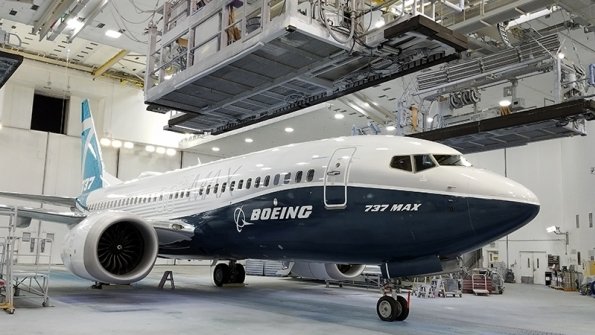US aviation regulators allowed Boeing's 737 Max aircraft to continue flying despite knowing there was a risk of further crashes.
Analysis after the first crash last year predicted there could be up to 15 disasters over the lifetime of the aircraft without design changes.
Despite this, the Federal Aviation Administration did not ground the Max until a second crash five months later.
FAA chief Steve Dickson, who started in August, said this was a mistake.
The FAA risk assessment was revealed during a US congressional hearing on Wednesday. Lawmakers are investigating Boeing following fatal 737 Max crashes in Indonesia in October 2018, and Ethiopia in March. The disasters killed 346 people in total.
Air safety officials investigating the crashes have identified an automated control system in the 737 Max 8, known as MCAS, as a factor in both accidents.
Boeing has said the system, which relied on a single sensor, received erroneous data, which led it to override pilot commands and push the aircraft downwards.
The FAA's investigation of the October Indonesia crash called for Boeing to redesign its system, warning of a risk of more than a dozen crashes over the 45-year lifetime of the roughly 4,800 737 Max planes in service.
Regulators also issued an alert to airlines, but the agency did not ground the aircraft until after the 10 March Ethiopia crash, several days after action by other countries.
"Was a mistake made?" asked Democrat congressman Henry Johnson.
"Obviously the result was not satisfactory," said Mr Dickson. In response to later questions, he admitted the agency had made a mistake at some point in the process.
READ ALSO: Minority questions Gov't decision to buy three Boeing aircraft for new national airline
'Grave concerns'
Boeing is revising the MCAS software, but lawmakers say their investigation has shown that the aircraft manufacturer was aware of flaws in the system.
Boeing staff have also raised concerns that the company was prioritising speed over safety at the factory that produced Max 737s, contributing to the crashes.
Ed Pierson, a former senior manager at the factory, told Congress he repeatedly warned Boeing's leadership of the safety risks caused by what he described as a "factory in chaos", but it had little effect.
He also said that, after the crashes, US government regulators have shown little interest in his concerns.
"I remain gravely concerned that... the flying public will remain at risk unless this unstable production environment is rigorously investigated and closely monitored by regulators on an ongoing basis," he said in prepared testimony.
Mr Dickson said the FAA is probing production issues. He also said he is considering further actions against Boeing.
In a statement, Boeing said Mr Pierson's own account showed the company took his concerns seriously.
"Company executives and senior leaders on the 737 programme were made aware of Mr Pierson's concerns, discussed them in detail, and took appropriate steps to assess them," it said.
 Source: BBC.COM





